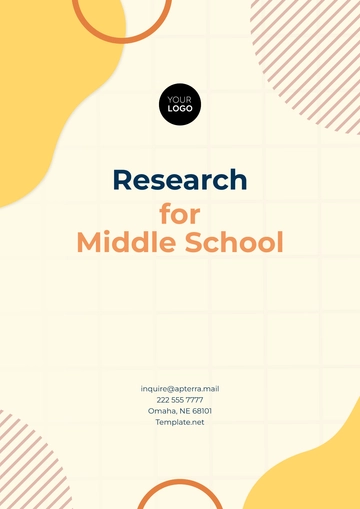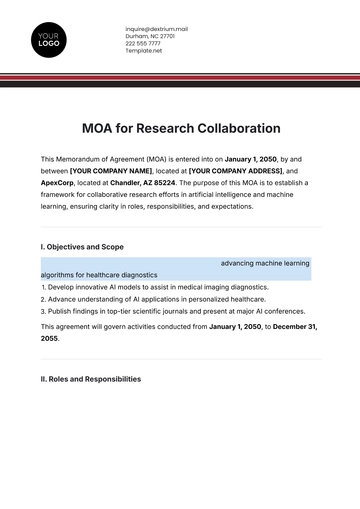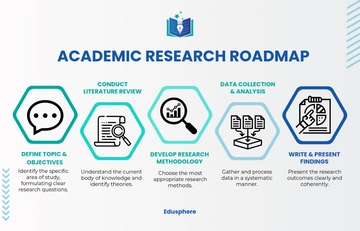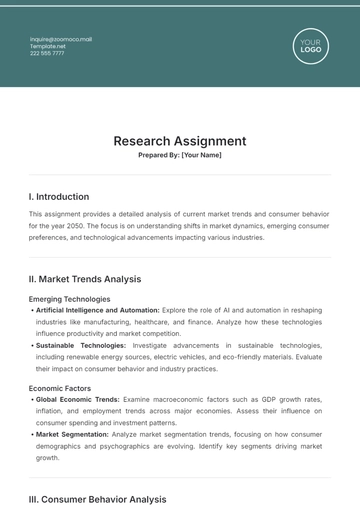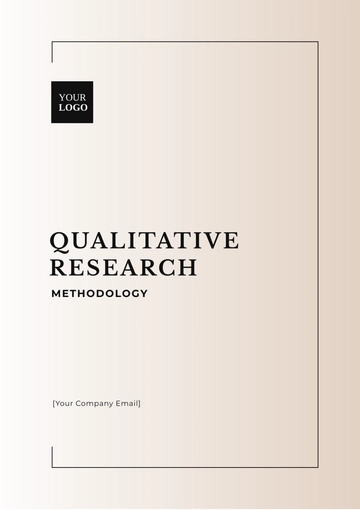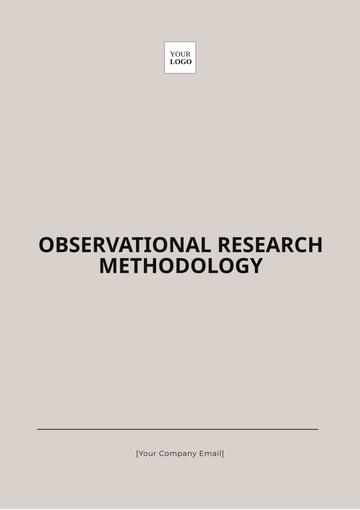ACADEMIC RESEARCH OUTLINE
I. Executive Summary
This research, conducted by [Your Name], Lead Researcher, and [Co-Researcher Name], investigates the impact of digital learning tools on student engagement and academic performance in high school education. Our objectives include assessing how various digital tools influence student interaction, analyzing their effect on academic results, and evaluating the overall effectiveness of these tools. We employed a mixed-methods approach, including surveys, interviews, and performance data analysis. Key findings indicate a positive correlation between the use of digital tools and improved student engagement and academic performance. Our conclusions suggest that integrating digital tools into the curriculum can enhance educational outcomes.
II. Introduction
A. Background and Context
In recent years, digital learning tools have become increasingly prevalent in education. These tools offer interactive and engaging ways for students to learn, potentially transforming traditional educational methods. This research explores the effects of these tools on student engagement and academic performance, addressing a critical need to understand their impact in modern classrooms.
B. Research Problem and Objectives
The research problem centers on the effectiveness of digital learning tools in improving student engagement and academic performance. Our objectives are:
To investigate the impact of digital tools on student engagement.
To analyze the relationship between digital tool usage and academic performance.
To evaluate the effectiveness of specific digital tools.
C. Research Questions or Hypotheses
Research Question: How do digital learning tools affect student engagement in high school education?
Hypothesis: The use of digital learning tools leads to higher levels of student engagement compared to traditional teaching methods.
Research Question: What is the correlation between the use of digital tools and academic performance?
Hypothesis: Students who frequently use digital learning tools perform better academically than those who use them less frequently.
III. Objectives
Objective Number | Description |
|---|
1 | To investigate the impact of digital tools on student engagement. |
2 | Analyze the link between digital tools and academic outcomes. |
3 | To evaluate the effectiveness of specific digital learning tools. |
IV. Literature Review
A. Summary of Relevant Research
Previous studies have highlighted the benefits of digital learning tools in increasing student engagement and improving learning outcomes. For example, Smith et al. (2052) found that interactive apps significantly enhanced student participation in math classes. Similarly, Johnson (2051) reported that multimedia resources positively impacted students' understanding of complex subjects.
B. Identification of Gaps
Despite the positive findings, there is a lack of comprehensive studies that assess the long-term effects of digital tools on academic performance. Additionally, research on the effectiveness of specific tools in different educational settings is limited.
V. Methodology
Component | Description |
|---|
Research Design | We employed a mixed-methods approach, combining quantitative and qualitative data. |
Data Collection | Data was collected through online surveys, teacher interviews, and analysis of student performance records. |
Data Analysis | Statistical analysis was used to evaluate survey responses, while thematic analysis was applied to interview data. |
VI. Results
Result Number | Description |
|---|
1 | Students using digital learning tools showed a 20% increase in engagement levels. |
2 | Academic performance improved by an average of 15% among frequent users of digital tools. |
3 | Tools such as interactive simulations and educational games were particularly effective. |
VII. Discussion
Discussion Point | Description |
|---|
1 | The positive impact on engagement suggests that digital tools can make learning more interactive and enjoyable. |
2 | The correlation between tool usage and academic performance supports the hypothesis that digital tools contribute to better learning outcomes. |
3 | Compared to traditional methods, digital tools offer unique advantages, but their effectiveness can vary depending on implementation. |
VIII. Conclusion
Conclusion Point | Description |
|---|
1 | Digital learning tools positively affect both student engagement and academic performance. |
2 | Our research contributes valuable insights into the effectiveness of digital tools in education. |
3 | Limitations include the short duration of the study and the variability in tool usage among students. |
IX. References
Reference Number | Description |
|---|
1 | Smith, J., Brown, A. (2052). Impact of Digital Learning Tools on Student Engagement. Educational Technology Journal. |
2 | Johnson, L. (2051). Multimedia Resources in Education: A Review. Journal of Educational Research. |
3 | Williams, R., Taylor, S. (2050). Long-Term Effects of Digital Tools on Learning Outcomes. Educational Review. |
X. Recommendations
A. Future Research
We recommend conducting longitudinal studies to assess the long-term impact of digital learning tools on academic performance. Further research should also explore the effectiveness of different types of digital tools in various educational contexts.
B. Practical Applications
Educators should consider integrating interactive digital tools into their teaching strategies to enhance student engagement and academic outcomes. Professional development programs for teachers could focus on effective ways to use these tools in the classroom.
Research Templates @ Template.net





